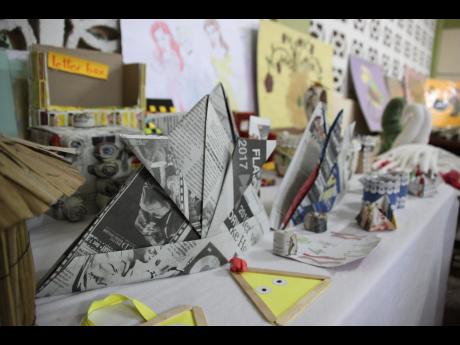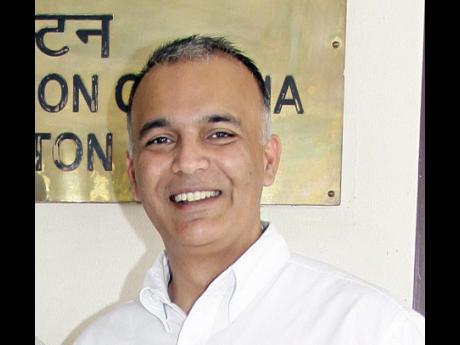Students learn valuable lessons in recycling
This was a classroom with a different take on it, books and copies gave way to old newspapers, plastic bottles, old directories, lentils, peanut shells, and the list went on.
Grade-five-students at Priory Primary and Infant School in St Ann were getting a valuable lesson, that of coexistence, appreciation, and conserving the environment, taught by JICA (Japan International Cooperation Agency) volunteer, Natsumi Oguchi.
"You should not throw garbage here and there, it is kills birds and animals," Oguchi told the class, pointing at photos of a turtle mangled in plastic chord, a bird choked by plastic, and dead fish washed up on the shore.
Caring for the environment is sacred in Japan, akin to praying an act of the mortal soul seeking blessings of the divine souls. This habit, Oguchi said she would like to develop among the children. "It is important for them to understand that they need to keep their surroundings clean and make it a part of their lifestyle," she said. "It is very sad to see people throwing garbage on the road; this is spoiling the beautiful countryside."
Assigned to the Jamaica 4-H Club, St Ann, Oguchi encourages students across several schools in the parish, to recycle and reuse items of daily use. Re-create the trash into functional pieces - bags from newspapers, coasters from discarded CDs, a serving tray made from peanut shells stuck on cardboard.
The response from the school community has been encouraging, and they are recognising and responding to this pressing issue; being a rural community, their coexistence and appreciation for nature is more intimate and personal.
"I am always searching for trash," Hyacinth Williams-Cole, teacher at Priory Primary and Infant School, said.
She said that driving around, she would stop by friends and family and ask them if they have any plastic bottles, old newspapers and cardboard boxes they are throwing away. "I put them in my car, in the trunk, even on the seats," she said.
Williams-Cole carries this 'trash' back to school or to a 4-H Club meeting, to be repurposed and used.
"The only flip side," she said, "is that I am reluctant to give a ride to anyone in my car, they might think I have lost my mind, carrying all this garbage around."
It is all being used for a good cause at end of the day.
FUNCTIONAL ROUTE
Back in the Grade-five class, the lesson for the day was to make paper bags from newspaper - Oguchi handed out pages from the old issues of The Gleaner to the students, and began to teach them. "Fold the paper in half, then the top part a little and fold over ...," she said, meticulously creasing the seams of the paper. After several folds symmetrical folds, the paper bag was ready.
Origami took a functional route.
The students' participation was inclusive, attentive and enthusiastic - they wanted to carry the bags home to show it to their parents and friends and make more of them.
"The objective," Oguchi said, "is to encourage recycling, and things made from these materials can be sold, it is not only good for the environment, but makes economic sense."
'Trash to cash' is popular in Japan and promoted by the government at all levels. As an island nation Jamaica could take a cue or two.
The bigger picture, though, according to this JICA volunteer, is to teach children in Jamaica about environment preservation and protection, disaster management and mitigation.
"It is important that they learn how to care for their surroundings [so]at the same time [they] are equipped to be prepared when natural disasters strike," Oguchi said.
The work to convert the trash to cash continues.
- The trip to Priory Primary and Infant School, St Ann was facilitated by the Japan International Cooperation Agency as a part of their press tour to visit some of the grass-roots and development assistance projects undertaken by the organisation in Jamaica.
- Send feedback to amitabh.sharma@hotmail.com






